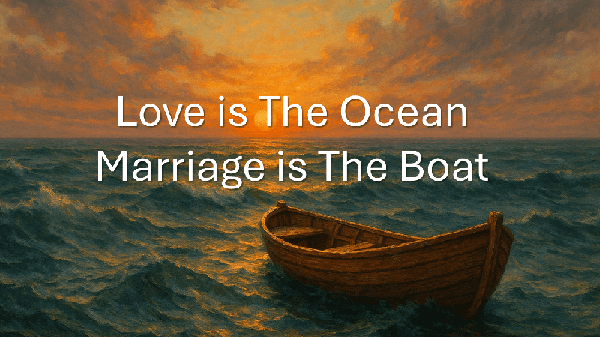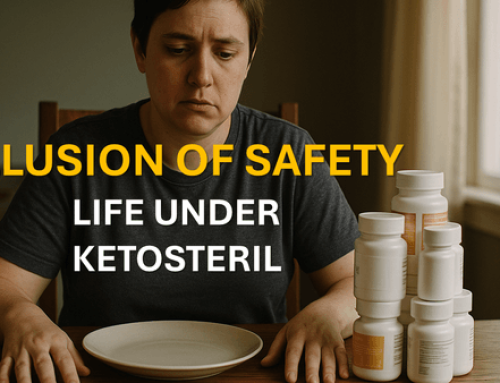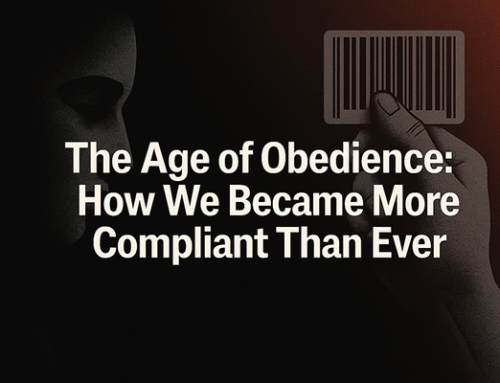💔 Before You Say “I Do”: Who’s Speaking—You, or the Story You Inherited?
A Zen-stick for the Soul Dressed as a Wedding Guest
They tell you to marry for love.
But what is that “love” you’re marrying for?
A person?
Or a picture?
A living presence?
Or a pre-approved life script whispered since childhood?
🌫️ Most don’t fall in love.
They fall into a story.
The house, the ring, the timeline, the dream.
And then they panic when reality doesn’t match the fairy tale.
They don’t question the script.
They question the person.
“You’ve changed.”
No—change isn’t betrayal.
The script is.
🎭 Ask yourself: Who is marrying whom?
Is it your soul, open and awake?
Or your fear of being alone?
Is it love—or the momentum of expectation, tradition, and unexamined longing?
Most people don’t marry a person.
They marry an idea.
🕊️ Love is wild. Marriage is structure.
Love is the ocean.
Marriage is the boat.
And most people leap into marriage thinking it’s still the ocean.
🪷 What if the one who stayed was already free?
Let’s talk about Yaśodharā, wife of Siddhartha—the man who became the Buddha.
He slipped out of the palace at night, leaving behind his wife and newborn son.
But she didn’t scream.
Didn’t chase.
Didn’t collapse.
Because she already knew.
She had seen through the illusion long before he began his quest.
What if Yaśodharā, not Siddhartha, was the first to awaken?
What if the real reason he left was not to find truth—
but because truth already lived beside him, and it terrified him?
She didn’t need a forest.
She didn’t need a guru.
She walked the path through stillness, grief, and the cage of duty—and still didn’t flinch.
And when he came back, now “The Buddha,”
he came to her.
Not out of guilt—but recognition.
Maybe she let him go because she was already ahead.
🐍 Or take Tulsidas’s wife—another blade hidden in the role of wife.
He scaled a wall, wild with longing, using a snake as a rope to reach her in lust.
She didn’t melt.
She didn’t praise.
She looked him dead in the soul and whispered:
“If only you had this passion for the Divine instead of this flesh—you’d already be free.”
She didn’t cling.
She didn’t beg.
She sliced his delusion open like a monk with a mirror.
That wound made him a saint.
Could you love someone enough to wound their illusion,
even if it means losing the story they wrote about you?
🔗 Control is fear dressed up as loyalty.
We try to freeze love into a contract.
We say:
“If you love me, prove it. If the feeling fades, it means you never did.”
That’s not love.
That’s emotional capitalism.
Love isn’t a deal.
It isn’t something to “work on.”
It isn’t a cage to protect you from change.
Love is presence. Marriage is agreement.
Confuse them, and you will suffer.
💥 Marriage is not therapy. Not salvation. Not a vaccine against loneliness.
It’s a contract.
A sacred one, yes—but a structure nonetheless.
And to enter it without seeing clearly is to build a house of glass and call it a fortress.
🧩 So before you say “I do”—
Ask:
- Who is speaking? My soul, or my fear?
- Am I marrying this person—or a fantasy?
- What if they change beyond recognition? Can I still love them, or just the version I once knew?
- Am I prepared to love without owning? To stay without clinging? To leave without destroying?
Stay if you can stay freely.
Go if you must—but do it with clarity, not cowardice.
Because true love does not trap.
It doesn’t collapse into control or guilt.
It offers itself, fully—but never begs to be held.
🔥 One last cut:
Before you say “forever,”
ask yourself:
Would I still choose this person if they stopped playing the role I cast them in?
If the answer is no—
you’re not marrying a person.
You’re marrying a dream.
And dreams, when clung to, become cages.
But if the answer is yes—
if you can love with open hands and open eyes—
Then you don’t need a vow.
That kind of love survives even when the story doesn’t.








Leave A Comment
You must be logged in to post a comment.